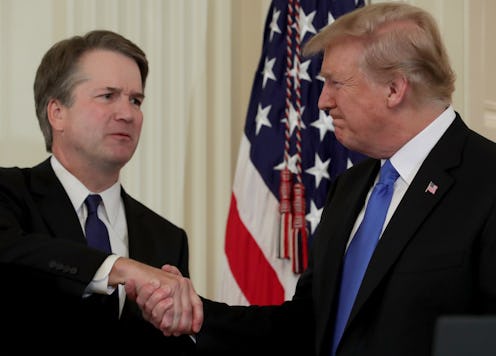
Now that Donald Trump has tapped one of the most conservative judges in the country to likely succeed Supreme Court Justice Anthony Kennedy, some people may be curious to know how Brett Kavanaugh regards Roe v. Wade. and abortion. His 2006 comments on Capitol Hill could help people understand how the federal appeals court judge views women's access to abortion services.
There is a reason why so many people are concerned about Kavanaugh's comments from 12 years ago. If Kavanaugh is confirmed as the successor to Kennedy — a possibility that Vox views as an "inevitability" given the current majority conservative makeup of the United States Senate — there is a possibility that the court could overturn its landmark Roe v. Wade ruling.
Roe v. Wade refers to the historic Supreme Court ruling in 1973. In simple terms, it declared that American women had the constitutional right to access an abortion. This colossal and groundbreaking right was part of the Fourteenth Amendment.
If a conservative majority in the Supreme Court overturns Roe v. Wade, some states like North Dakota, South Dakota, Mississippi, and Louisiana will completely ban abortion services. Other states could reinstate restrictions on abortion access. But banning abortion doesn't make it abortion go away. Instead, those in need will seek self-induced abortions which are downright dangerous — and sometimes even fatal since there is no formal medical supervision.
In 2006, during a confirmation hearing for the Washington, D.C., Circuit Court on Capitol Hill, New York Sen. Chuck Schumer asked Kavanaugh, "Do you consider Roe v. Wade to be an abomination? And do you consider yourself to be a judicial nominee, like the president said he was going to nominate people, in the mold of [former Justice Antonin] Scalia and [Justice Clarence] Thomas?"
Kavanaugh responded to the senator, "Senator, on the question of Roe v. Wade, if confirmed to the DC Circuit, I would follow Roe v. Wade faithfully and fully. That would be binding precedent of the Court." But Kavanaugh avoided giving his personal take on Roe v. Wade — a move not lost on Schumer who continued to grill him.
Schumer reiterated his question: "I asked you your own opinion." Kavanaugh continued to dodge the senator's pointed query and said, "And I’m saying if I were confirmed to the DC Circuit, Senator, I would follow it. It’s been reaffirmed many times, including in Planned Parenthood v. Casey."
Schumer asked one more time: "I understand. But what is your opinion? You’re not on the bench yet. You’ve talked about these issues in the past to other people, I’m sure."
"The Supreme Court has held repeatedly, Senator, and I don’t think it would be appropriate for me to give a personal view of that case," Kavanaugh answered.
A terse Schumer then said, "Okay, you are not going to answer the question."
In addition to Kavanaugh's comments to Schumer in 2006, the judge is also notorious for his dissent in a ruling from the Washington, D.C., Circuit concerning an undocumented teenager seeking abortion while in federal custody in 2017. Kavanaugh wrote in his dissent that "the government has permissible interests in favoring fetal life, protecting the best interests of a minor, and refraining from facilitating abortion." He also said that majority ruling was "based on a constitutional principle as novel as it is wrong: a new right for unlawful immigrant minors in US government detention to obtain immediate abortion on demand."
Ultimately, however, Kavanaugh said that "all parties to this case recognize Roe v. Wade and Planned Parenthood v. Casey as precedents we must follow."
Considering his statements in 2006 and his dissent in 2017, reproductive rights activists and prominent Democrats have been alarmed by Trump's support for Kavanaugh. House Minority Leader Nancy Pelosi and Connecticut Sen. Chris Murphy have voiced their opinions against Kavanaugh.
In another instance, Massachusetts Sen. Elizabeth Warren tweeted, "Brett Kavanaugh's record as a judge and lawyer is clear: hostile to health care for millions, opposed to the [Consumer Financial Protection Bureau] and corporate accountability, thinks Presidents like Trump are above the law — and conservatives are confident that he would overturn Roe v. Wade."
Given those reasons, Warren concluded, "I'll be voting no." From the looks of criticism against him, Kavanaugh's stance on abortion and vague remarks about Roe v. Wade seems to be significant cause for concern among pro-choice segment of America.